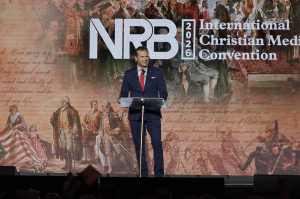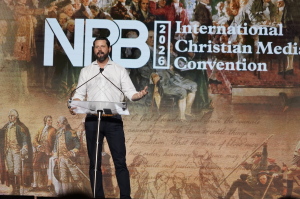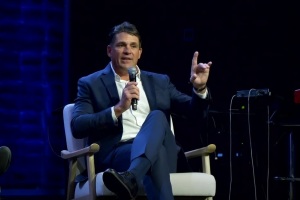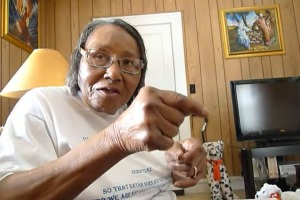Evangelical Defends Decision to Speak at Mormon Tabernacle
Ravi Zacharias, one of two evangelical leaders who addressed a Mormon crowd at the flagship Mormon temple in Salt Lake City, defended his decision to speak at the joint Mormon-Evangelical gathering last month, to “the critics who objected
Ravi Zacharias, one of two evangelical leaders who addressed a Mormon crowd at the flagship Mormon temple in Salt Lake City, defended his decision to speak at the joint Mormon-Evangelical gathering last month, in a statement to “the critics who objected to my being there.”
“All my life as an apologist I have spoken across wide chasms of thought and virtually to every major religious group, sometimes at the risk of threats and violence. Differences ought not to keep us from carrying the truth to everyone. Must we not graciously build one step at a time in communicating our faith with clarity and conviction?” he explained.
In the 6 weeks since Zacharias and Fuller Seminary President Richard Mouw addressed the Mormon crowd, numerous evangelical Christians raised questions about the reasoning and motive for the gathering. Specifically, they questioned Mouw’s brief statements concerning evangelicals’ treatment of the Mormon community.
"We've often seriously misrepresented the beliefs and practices of members of the LDS faith," Mouw was quoted as saying. "It's a terrible thing to bear false witness ... We've told you what you believe without first asking you."
"I remain convinced there are serious issues of difference that are of eternal consequence, but now we can discuss them as friends," Mouw said, according to the Salt Lake City Tribune.
Mouw released a statement of clarification within days of the Nov. 14 gathering, during which he apologized for the “unnecessary confusion” caused by his address. He assured critics that he sees the differences between the Christian and Latter-Day-Saints faith traditions.
Nonetheless, he stood by his initial comments, saying to the evangelical community that “at the very least admit that we have not always been fair in our wholesale condemnation of Mormonism as simply a false religion.”
Zacharias’ comments echoed that of Mouw’s.
“Is it really necessary at the early stages of such openness to “dump the whole truckload of goods,” rather than first gaining a hearing and respect?” he wrote. “I have no doubts about the differences between the LDS faith and the historic Christian faith, differences that are deep and foundational in terms of authority.”
Zacharias added that the message he preached is available online, and thus encouraged critics to hear it.
”As you hear the message presented, I pray you will hear the sound of the seed being sown. Only Heaven will reveal the fruit that has resulted,” he wrote.
The following is the full text of the statement released by the Ravi Zacharias International Ministry:
Many have asked how the invitation to the Mormon Tabernacle came about. Ten years ago, I was invited by the philosophy department at Brigham Young University to deliver a series of lectures on atheism and theism, a comparative study. At that time I also presented a defense of the Christian faith. Much has transpired in the intervening years as evangelical Christian scholars and Mormon scholars have held discussions on their differing faiths. Sometime ago, a group of about 150 churches and academic institutions under the leadership of Greg Johnson of Standing Together invited me to speak in defense of the Christian faith at a series of open forums on university campuses in Utah. Greg then suggested that perhaps the LDS church would open the Tabernacle for a major presentation by an evangelical Christian.
With that in mind, Greg and Bob Millet (from the faculty of Brigham Young University) approached the First Presidency with the idea and to everyone’s surprise, they graciously agreed to extend an invitation to me. Greg and Bob came to my office in Atlanta to discuss with me what this meant and how we should go about this. Needless to say, I had a lot of questions on the “why” of such an invitation. What it boiled down to was that they were interested in hearing from an evangelical Christian about what lay at the heart of our faith. I asked for two personal conditions. One, that I be given the privilege of selecting the subject and two, that I bring someone to provide the music. They gladly granted both. But even after that I hesitated till several key evangelical leaders and professors from across the country wrote and urged me to accept the invitation to speak at the Tabernacle. After much prayer and reflection, I did. I selected the subject: The Exclusivity and Sufficiency of Jesus Christ. I asked Michael Card if he would come and provide the music.
November 14th was the historic moment. The last time an evangelical Christian had spoken there was in 1899 when D.L. Moody spoke. I have to say the entire weekend was one remarkable event after another. I had a personal meeting with the First Presidency. I did open forums at Weber State University and at the University of Utah. The climactic meeting at the Mormon Tabernacle was packed with an overflowing crowd. What a night it was!
From all over the world I have received numerous messages of encouragement and appreciation. Anyone who hears the tape will know the clarity of the message presented. Only the Lord gave such enablement.
To the critics who objected to my being there, I say that all my life as an apologist I have spoken across wide chasms of thought and virtually to every major religious group, sometimes at the risk of threats and violence. Differences ought not to keep us from carrying the truth to everyone. Must we not graciously build one step at a time in communicating our faith with clarity and conviction? Is it really necessary at the early stages of such openness to “dump the whole truckload of goods,” rather than first gaining a hearing and respect? I have no doubts about the differences between the LDS faith and the historic Christian faith, differences that are deep and foundational in terms of authority. But the proclamation of the living Christ can break down hearts all over the world that we might see ourselves as He sees us and call upon Him and no one else for our salvation. Must not our methods be in keeping with our message? There are numerous instances in Scripture where Jesus went to those of a contrary view and with grace, sowed one small seed at a time. I must also add that the courtesy and graciousness extended to me by every Mormon leader or professor that I came into contact with cannot be gainsaid. My earnest prayer is that the Lord was honored in what happened and that the opportunities that come from this event will multiply. There is no other name given under heaven whereby we may be saved. How we communicate that name is equally important as the message itself if we are to be persuaders of men and women under the anointing of the Holy Spirit.
As you hear the message presented, I pray you will hear the sound of the seed being sown. Only Heaven will reveal the fruit that has resulted.
Ravi Zacharias



























